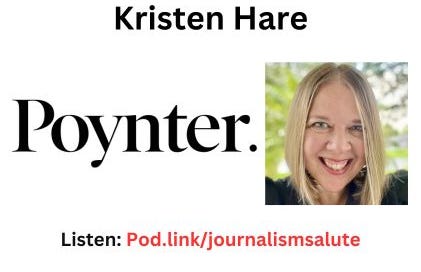New interview: Kristen Hare on 'Chicken Dinner News' and The Power of Obituaries
We talk with Poynter's director of local news and craft
Our latest episode is a wide-ranging conversation with Kristen Hare, director of craft and local news at Poynter Institute
Poynter is a global nonprofit that strengthens democracy by improving the relevance, ethical practice, and value of journalism. Through teaching, publishing, convening, fact checking and media literacy Poynter creates a crossroads where communities come together to use journalism to confront society's complex problems.
Trends in local news coverage made up part of the conversation, but to show you some of the different paths we took, here are three question-and-answer exchanges. Enjoy the episode!
Besides sports and obituaries and things like gardening, what are some of the other key components sections that make up a good local journalism outlet?
one of the best terms I've heard for the value of this kind of news is 'chicken dinner news.' The news that is telling you about all the things happening in your, in your community. Everything from like weather to hey, there's a water shutdown, what the local kids are doing, school board coverage, local municipalities, what's happening with your local government, but also these milestones, deaths, births, graduations, weddings, anniversaries, the society page, the restaurants that are opening or closing.
It's what's happening where you are and how does that impact you? I have a great newspaper here near where I live, that shows up on my my driveway once a week.
And it has how the Boy Scouts are, are going door to door and here's where you can get Girl Scout cookies and here's what this church did and it's not the kind of stuff that is gonna rise to the level of a regional or a national newsroom, but it matters tremendously for the quality of life where we live and is still really important information to be able to get.
You wrote feature obituaries for the Tampa Bay Times. You did a study about writing them. You even started an obituary newsletter at one point. Do you have a favorite obituary that you've done and can you articulate on the keys to doing one?
I loved doing all of them. I got to write one about this man named Bruce. He was a Chicago transplant who owned a hotdog restaurant with Chicago style hot dogs. And somebody reached out to me when he died because they hadn't heard about it. His death was quiet and lonely and very few people knew about it.
I wrote a piece asking people who knew him to write me and share his stories. This restaurant had closed, I couldn't find any employees. A crowdsourcing call. I wrote a crowdsource obit and I got hundreds of emails from people who knew and loved him, customers, employees, friends, just piecing together these quotes that people had sent to me.
It was such an important reminder of how much people care about other people. When we give them the opportunity to remember and celebrate, they will.
I think the keys to doing an obituary well can all be boiled down to one basic tip. The details are everything. They matter tremendously. When someone dies, the survivors in that fog of grief use platitudes scaffolding to hold themselves up.
He was a great person. She would give you the coat off her back, the shirt off of her back. She believed in people. When you aren't in the habit of doing these kind of stories, you may take that and not want to push more. But when you do push more and say, well, give me an example of how they supported people. Give me an example of how they were selfless. You have to ask a couple times and in a couple different ways to several people, but you will eventually discover really incredible things about people that allow you to do the thing that good journalism does when it's doing its best, which is to show and not tell.
Holding in for those details, digging for them gently. You're using a tweezer and not a pitchfork to very gently poke around and find them. Have the patience to understand that the grief does funny things to people's brains. But writing and getting to tell someone's story is a healing thing to get to go through.
It's important work and it's such a privilege to get to do it. I really feel lucky that I got to do it for five years.
How has serving in the Peace Corps impacted you as a person and how has being a journalist impacted you as a person?
My answer for these are the same. They both had the same impact on me and they have informed each other. And that is basically: I am best when I remember to show up. Listen, pay attention and let stories and people reveal themselves.
If I come in and think I have all the answers, or I know what the story is, or I know what the members of the community where I live need, I will crash and burn.
Just show up and shut up and let things unfold the way that they're going to and, and be there to witness it.





Yay, Kristen! She's the best. Love these conversations, Mark!